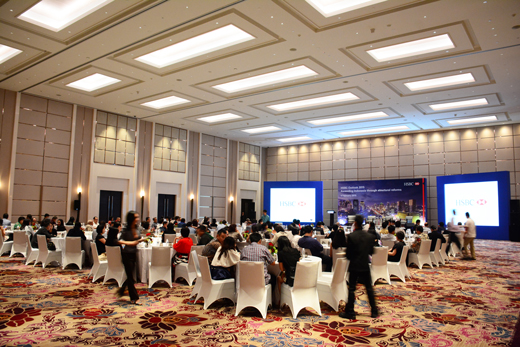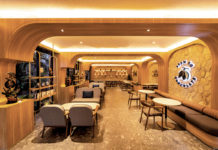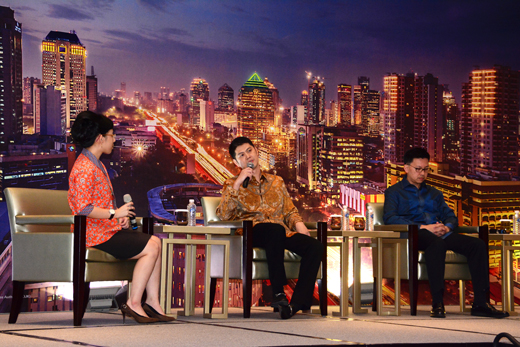On the Verge if Breakthrough
HSBC OUTLOOK 2015 ADDRESSED MANY QUESTIONS AND ANALYSED MARKET-CHANGING FACTORS TO ASCERTAIN WHAT LIES IN STORE FOR INDONESIA’S INVESTMENT GRADE IN THE NEAR FUTURE.
After powering through a number of domestic events in 2014, both negative and positive, investors are anxiously looking at Indonesia’s investment market with great expectations. The inauguration of the new president in the second half of 2014 was met with great response, but both foreign and domestic investors are currently on the edge of their seats as they await the sovereign structural reform policy and what impact it may have on the country’s general investment scene.
To navigate ahead, an informative seminar was held by HSBC Indonesia, entitled “HSBC Outlook 2015: Ascending Indonesia through Structural Reforms”. Reflecting the value of the bank’s philosophy to focus on the most important economy in the world, namely its customers’ own, the seminar was primarily a tribute offered by HSBC Indonesia to their most valued Premier customers.
The event was held at the fabulous ballroom of the newly opened Fairmont Hotel Jakarta on 4th February, 2015, and saw three respectable authorities on the panels: Eddy Handali, CFA Director of PT Fitch Ratings Indonesia; PT Ashmore Asset Management Indonesia’s Director Arief Wana, and Bank Indonesia’s Director of Economic and Financial Policy, Doddy Zulverdi.
HSBC’s own experts included Senior Vice President and Head of Wealth Management Steven Suryana, Senior Vice President and Head of Network Diza Larantie, Head of Marketing Maria Sukrisman and panel moderator Limiati Purnomo.
A Breeze of Optimism
The seminar established early on that, according to various concrete financial reviews, as well as credible sources, the recent happenings in the financial industry over the last year had had a relatively positive impact on Indonesia’s economic growth.
Eddy Handali of Fitch Ratings remarked that the agency was hopeful when looking at Indonesia’s economic growth in 2015, which showed an overall continuation of gradual improvement streaks in credit profiles and credit fundamentals that had started with the post-political reformation era of 1999 to 2004. Up to the present day, Eddy emphasized that some of the key concerns that foreign investors in particular were anticipating were “investment access, Indonesia’s tax earnings, eradication of corruption, and infrastructure management, all highly vital in driving down logistical expenses.”
Arief emphasized that Indonesia’s ability to retain its Investment Grade status showed that the international financial community placed faith in the country’s positive political and economic developments, which led to “both foreign and domestic improvement of liquidity”. Arief also stated that the regulator’s (the central bank) trend of lowering interest rates allowed more room for the private sector to leverage capital, which could, in turn, lead to more economic improvement.
While affirming that the domestic economy was expected to improve in 2015, Doddy also spoke of several factors to watch out for that could impede the economy, one being low global support manifested domestically through a number of factors, including the deceleration of China’s economy, which is Indonesia’s primary economic partner. Another factor preventing international support is Indonesia’s low capability to supply manufactured goods, such as electronics, textiles and automotive components, which are in high demand, particularly by the United States, which is the sole engine sustaining global economic growth at this juncture.
Shifting again to highlight the silver lining, Doddy was confident that the central bank would be able to control inflation at a low level thanks to the declining global prices of oil and other commodities. Investors needed to remember that Bank Indonesia’s mandate was to contain inflation and maintain the stability of the Rupiah exchange rate, against the USD in particular.
The central bank’s representative pointed out Bank Indonesia’s resolve to stabilize Rupiah exchange rate volatility to prevent a drop in export values. In turn, the government’s structural policies are expected to encourage exports from manufacturing instead of mined goods, so that Indonesia’s exports have added value.
Upon the disclosure of this information, the question remained: How should investors proceed with their investment strategy in 2015?
Arief conveyed that Ashmore was taking a very optimistic stance on financial market growth, especially in the second semester of 2015, as they considered the current state of government restructuring and reformation as a very rare situation. “Investors would do well to seize this moment to enter the market, as potential growth may not be as significant at this point in the second semester.”
The panel then shared two profound strategies essential for retail investors in the capital market, namely performing an assessment by calculating time horizons against risk appetite, then deciding on investment in equity, Government bonds, or a combination of both. When investing in equity, investors need to be aware of the differentiation between blue chip (big capitalization) and small-medium capitalization stocks. Small-mid cap stocks, commonly known as second liners, are more volatile than blue chips and usually take a longer time to realize full potential. Thus, investors considering small-mid cap stocks are advised to ensure a longer time horizon and the ability to bear volatility.
In terms of risk, blue chips have relatively lower risk compared to second liner stocks. Given decent fundamentals in company performance, small cap stocks might just have a few surprises in store, and it should be noted that there are still a number of under-appreciated and under-valued opportunities within second liner stocks that remained “undiscovered”.
 The panels likened Indonesia’s current state of economic progress to “an unpolished diamond” that has yet to show its finest qualities. The capital market is decently attractive and is heading towards progressively better levels.
The panels likened Indonesia’s current state of economic progress to “an unpolished diamond” that has yet to show its finest qualities. The capital market is decently attractive and is heading towards progressively better levels.
The Q&A session of the evening sparked a lively discussion in which differing opinions went head-to-head and produced ideas and conclusions surpassing those previously thought of by both the inquirer in the audience and the experts on the panel. All of HSBC’s Premier customers at the seminar were more than satisfied with the knowledge they gathered in the evening and most were anxious to delve even deeper to translate potentials in the capital market to their investment portfolios in 2015.
In conclusion, host Diza Larantie conveyed that HSBC, as a trustworthy financial partner, would strive to offer necessary guidance and informative advice to suit the needs of their investing clients. Despite the overall economic situation, HSBC’s global network of experts aims to constantly assist their Premier Customers to remain on track with managing their personal economy, wealth and beyond.






















